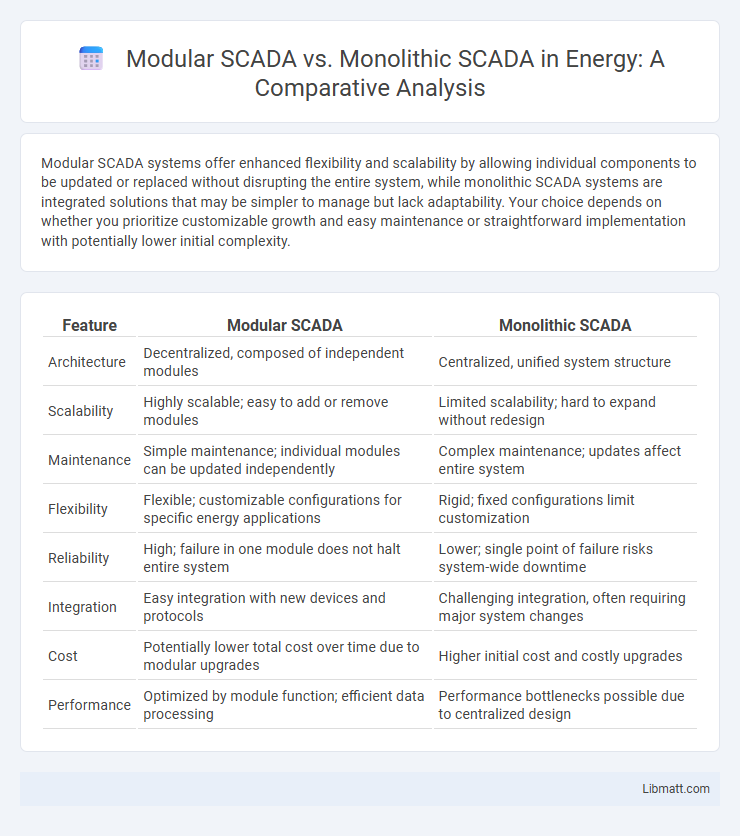Modular SCADA systems offer enhanced flexibility and scalability by allowing individual components to be updated or replaced without disrupting the entire system, while monolithic SCADA systems are integrated solutions that may be simpler to manage but lack adaptability. Your choice depends on whether you prioritize customizable growth and easy maintenance or straightforward implementation with potentially lower initial complexity.
Table of Comparison
| Feature | Modular SCADA | Monolithic SCADA |
|---|---|---|
| Architecture | Decentralized, composed of independent modules | Centralized, unified system structure |
| Scalability | Highly scalable; easy to add or remove modules | Limited scalability; hard to expand without redesign |
| Maintenance | Simple maintenance; individual modules can be updated independently | Complex maintenance; updates affect entire system |
| Flexibility | Flexible; customizable configurations for specific energy applications | Rigid; fixed configurations limit customization |
| Reliability | High; failure in one module does not halt entire system | Lower; single point of failure risks system-wide downtime |
| Integration | Easy integration with new devices and protocols | Challenging integration, often requiring major system changes |
| Cost | Potentially lower total cost over time due to modular upgrades | Higher initial cost and costly upgrades |
| Performance | Optimized by module function; efficient data processing | Performance bottlenecks possible due to centralized design |
Introduction to SCADA Architectures
Modular SCADA architecture divides the system into independent, functional components to enhance flexibility and scalability, enabling easier maintenance and customization for complex industrial processes. Monolithic SCADA systems integrate all functionalities into a single, unified unit, offering simplicity but limiting adaptability and expansion options. The choice between modular and monolithic SCADA architectures significantly impacts system performance, operational efficiency, and long-term upgrade potential in industrial automation environments.
Defining Modular SCADA Systems
Modular SCADA systems consist of independent, interoperable modules that communicate through standardized interfaces, allowing scalable and flexible configurations tailored to specific industrial needs. Unlike monolithic SCADA, which integrates all functions into a single, rigid architecture, modular SCADA enhances maintainability, upgrades, and customization by isolating components such as data acquisition, control, and visualization. This architecture optimizes system performance and facilitates integration with new technologies, improving operational efficiency in complex industrial environments.
Understanding Monolithic SCADA Systems
Monolithic SCADA systems are characterized by their single, integrated architecture where all components and functions are tightly coupled within one software platform. This design often results in less flexibility, slower scalability, and more challenging maintenance compared to modular SCADA systems. Monolithic SCADA systems typically require extensive downtime for upgrades and modifications, limiting adaptability in dynamic industrial environments.
Core Differences Between Modular and Monolithic SCADA
Modular SCADA systems consist of separate, interchangeable components that allow for scalable customization and easier maintenance, while Monolithic SCADA systems operate as a single, integrated unit with fixed architecture. You benefit from modular SCADA through enhanced flexibility, faster upgrades, and improved fault isolation compared to the rigid, all-in-one design of monolithic SCADA. The core difference lies in modularity, where modular SCADA supports dynamic expansion, whereas monolithic SCADA can face limitations in adaptability and scalability.
Scalability: Modular vs Monolithic SCADA
Modular SCADA systems offer superior scalability by allowing seamless integration of new modules and components without overhauling the entire system, making them ideal for expanding operations. In contrast, monolithic SCADA architectures have limited scalability due to their tightly coupled design, which requires significant reconfiguration or replacement to accommodate growth. Scalability in modular SCADA supports flexible system expansion and improved resource optimization, crucial for evolving industrial environments.
Flexibility and Customization Capabilities
Modular SCADA systems offer superior flexibility and customization capabilities by allowing users to easily add, remove, or modify individual components based on specific operational needs. Monolithic SCADA systems, in contrast, have fixed architectures that limit adaptability and require extensive redesign for significant changes. This inherent modularity enables faster deployment and tailored solutions in dynamic industrial environments.
Integration with Modern Technologies
Modular SCADA systems offer superior integration with modern technologies such as IoT devices, cloud computing, and AI-driven analytics due to their flexible, component-based architecture. Monolithic SCADA systems often struggle to adapt quickly to these advancements because of their rigid, centralized design. Your operations gain enhanced scalability, real-time data processing, and seamless interoperability when utilizing modular SCADA solutions over monolithic alternatives.
Security Considerations in Both Architectures
Modular SCADA architectures enhance security by isolating system components, limiting the impact of cyberattacks and simplifying updates or patches without disrupting the entire network. Monolithic SCADA systems, while potentially easier to manage centrally, often present higher risks due to their interconnected and less segmented nature, making a single vulnerability capable of compromising the entire control infrastructure. Understanding these differences allows you to implement security measures tailored to the architecture, strengthening your system's resilience against evolving cyber threats.
Cost Implications and ROI Analysis
Modular SCADA systems offer lower upfront costs and scalable investments by allowing you to add functionalities as needed, reducing capital expenditure and improving budget flexibility. Monolithic SCADA systems demand higher initial investment with all-in-one deployment, often leading to increased maintenance expenses and slower ROI due to rigid infrastructure. Evaluating your operational scalability and long-term ROI favors modular SCADA for cost-effective growth and optimized asset utilization.
Choosing the Right SCADA Approach for Your Operations
Modular SCADA systems offer scalability and flexibility by allowing incremental additions and customizations tailored to specific operational needs, making them ideal for complex or evolving environments. Monolithic SCADA systems provide a unified, integrated platform with consistent performance and simplified maintenance, often preferred for smaller or stable operations with well-defined workflows. Evaluating factors such as system complexity, future expansion plans, budget constraints, and integration requirements is essential for selecting the most effective SCADA architecture to optimize operational efficiency and reliability.
Modular SCADA vs Monolithic SCADA Infographic

 libmatt.com
libmatt.com